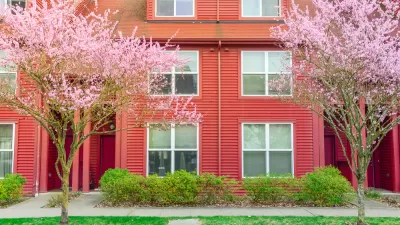Neighborhoods with preexisting internal contracts are exempted from new legislation requiring all Washington cities to permit duplexes and other ‘missing middle housing.’

Earlier this year, the Washington state legislature passed legislation aimed at eliminating single-family zoning and creating more diverse and abundant housing options in the state. However, as David Gutman and Daniel Beekman report in The Seattle Times, “homeowner associations and other ‘common interest communities’ that have internal contracts or documents governing their zoning rules” are exempt from the new law, effectively allowing them to remain exclusively zoned for single-family homes.
“Because homeowner associations and common interest communities have preexisting, legally binding contracts regarding their zoning rules, the Legislature can’t change those, said Rep. Jessica Bateman, D-Olympia, the bill’s lead sponsor,” explaining the exemption. “The bill does explicitly bar homeowner associations from making new contracts or agreements to try to prohibit duplexes and other kinds of middle housing. But it only applies to future agreements, those enacted after the law becomes effective.”
According to University of Washington law professor Hugh Spitzer, “people can put restrictive covenants on their properties and you can’t have a law that comes in and wipes that out,” except in the event that the law is related to safety, such as the requirement to add a fire escape. Yet state law does, as Gutman and Beekman point out, govern some aspects of homeowner association rules, including legislation that bans HOAs from prohibiting certain flags, political signs, and solar panels.
The authors remind readers of the sordid history of HOAs. “In Seattle, and across the country, many homeowner associations were created a century ago for the express purpose of excluding racial and religious minorities.” The article continues, “These are the same communities that today won’t be touched by middle housing, which supporters of HB 1110 say can diversify neighborhoods by providing options at different price points.”
FULL STORY: WA’s new ban on single-family zoning exempts some of Seattle’s wealthiest neighborhoods

Study: Maui’s Plan to Convert Vacation Rentals to Long-Term Housing Could Cause Nearly $1 Billion Economic Loss
The plan would reduce visitor accommodation by 25,% resulting in 1,900 jobs lost.

Alabama: Trump Terminates Settlements for Black Communities Harmed By Raw Sewage
Trump deemed the landmark civil rights agreement “illegal DEI and environmental justice policy.”

North Texas Transit Leaders Tout Benefits of TOD for Growing Region
At a summit focused on transit-oriented development, policymakers discussed how North Texas’ expanded light rail system can serve as a tool for economic growth.

Paris Bike Boom Leads to Steep Drop in Air Pollution
The French city’s air quality has improved dramatically in the past 20 years, coinciding with a growth in cycling.

Why Housing Costs More to Build in California Than in Texas
Hard costs like labor and materials combined with ‘soft’ costs such as permitting make building in the San Francisco Bay Area almost three times as costly as in Texas cities.

San Diego County Sees a Rise in Urban Coyotes
San Diego County experiences a rise in urban coyotes, as sightings become prevalent throughout its urban neighbourhoods and surrounding areas.
Urban Design for Planners 1: Software Tools
This six-course series explores essential urban design concepts using open source software and equips planners with the tools they need to participate fully in the urban design process.
Planning for Universal Design
Learn the tools for implementing Universal Design in planning regulations.
Smith Gee Studio
Alamo Area Metropolitan Planning Organization
City of Santa Clarita
Institute for Housing and Urban Development Studies (IHS)
City of Grandview
Harvard GSD Executive Education
Toledo-Lucas County Plan Commissions
Salt Lake City
NYU Wagner Graduate School of Public Service





























